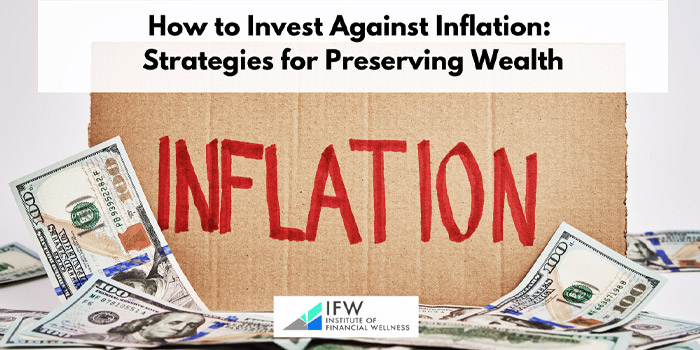Inflation-resistant investments are like your financial bodyguards in your retirement portfolio, ready to safeguard your savings against the impact of rising inflation. Key strategies include investing in Treasury Inflation-Protected Securities (TIPS), real estate, stocks, commodities, and those digital coins that everyone pretends to understand—cryptocurrencies.
Investors should consider risk tolerance, retirement goals, and time horizons to build a diversified portfolio that protects against inflation, ensuring financial stability. This approach is crucial for retirement planning, as it helps secure a steady income stream and maintain purchasing power. Monitoring your retirement score is also essential, as it provides a snapshot of how well your investment strategy is aligned with your goals.
Key Takeaways
- Treasury Inflation-Protected Securities (TIPS) provide a safe investment option that adjusts with inflation, preserving purchasing power and offering reliable income.
- Real estate investments, including residential properties and REITs, serve as effective inflation hedges due to the potential for value appreciation and rental income.
- Investing in commodities and cryptocurrencies can provide additional protection against inflation, with assets like gold and Bitcoin being notable for their historical value retention.
Treasury Inflation-Protected Securities (TIPS)

Treasury Inflation-Protected Securities (TIPS) are a type of U.S. Treasury bond designed to protect investors from rising inflation. Unlike regular bonds, TIPS adjust their principal value based on changes in the Consumer Price Index (CPI), ensuring that your investment retains its purchasing power even as inflation rises. This unique feature makes TIPS one of the safest investments during inflationary times, as they effectively eliminate inflation risk.
- When inflation rose sharply in the past, TIPS demonstrated their value by ramping up in price, ensuring that investors did not lose out due to increasing costs of living.
TIPS provide a reliable hedge against inflation with their blend of safety and inflation protection.
How TIPS Work:
The principal value of TIPS bonds adjusts according to the inflation rate. This means that as the CPI rises, the principal amount of TIPS increases, ensuring that the investment keeps up with rising prices. TIPS bonds pay interest twice a year based on the adjusted principal, providing investors with a consistent income stream that also rises with inflation.
At maturity, investors receive the higher of the inflation-adjusted principal or the original principal, providing a safety net against deflation. Backed by the U.S. government, TIPS are a low-risk and stable investment.
Benefits of Investing in TIPS:
These bonds add returns and protection to an investment portfolio, making them essential during periods of high inflation. TIPS offer several advantages, especially during inflationary periods.
- Backed by the U.S. federal government, they ensure a high level of stability and security.
- At maturity, investors receive either the adjusted principal or the original principal, guaranteeing safety against inflation.
- Interest income from TIPS is exempt from state and local taxes, providing tax benefits.
Potential Drawbacks:
Despite their benefits, TIPS have drawbacks.
- They may yield lower returns than traditional bonds
- These bonds carry risks like deflation and increased sensitivity to interest rate changes.
- Higher taxes on the increased face value can also diminish some benefits.
- If sold before maturity, TIPS can incur losses, so it’s important to consider the holding period before investing.
Real Estate Investments

Real estate is a reliable inflation hedge. Property values tend to increase with inflation, maintaining and even growing in value. This sector protects wealth and offers potential rental income. During inflationary periods, landlords can often raise rents, increasing their income. Real estate is a tangible asset, making it a safe haven in times of economic uncertainty with unique benefits and opportunities to hedge against inflation.
Real estate investments include:
- Residential properties
- Commercial real estate
- Real Estate Investment Trusts (REITs)
Residential Properties:
Residential properties offer value appreciation and rental income as reliable inflation hedges. A fixed-rate mortgage helps homeowners manage housing expenses by ensuring consistent monthly payments, providing financial stability.
- Owning a home offers financial benefits like mortgage interest tax deductions.
- Property prices and rental income typically rise during inflation, enhancing investment value.
Commercial Real Estate:
Commercial real estate offers significant revenue opportunities such as rental income as well as value appreciation and inflation protection. Investors seeking tangible inflation hedges may find it worthwhile to opt for real estate such as:
- Office spaces
- Retail properties
However, demand can be influenced by economic growth and trends such as increased remote work, creating some uncertainty.
Real Estate Investment Trusts (REITs):
Real Estate Investment Trusts (REITs) let investors benefit from the real estate market without owning physical properties. They offer liquidity and diversification, providing lower risk and higher flexibility.
- REITs pool capital from multiple investors to invest in a diversified portfolio of real estate assets, offering stable returns and reduced risk compared to individual property investments.
Commodities

Commodities often rise in price with inflation, making them a clear indicator of it. Investing in commodities helps maintain financial stability as they keep pace with inflation. These essential tangible assets are valuable during inflationary periods.
Non-Gold Commodities:
Non-gold commodities are tangible assets that often appreciate with inflation. Investors can trade commodities through futures contracts and ETFs, offering flexibility and making it easier to include them in a diversified portfolio as an effective inflation hedge. Examples include:
- Oil
- Natural gas
- Grains
- Beef
- Coffee
- Orange juice
While commodities can help maintain financial stability, investors should be aware of the volatility and risks associated with unpredictable prices and geopolitical tensions.
Gold and Precious Metals:
Gold and other precious metals have historically been safe-haven assets during inflation. Gold retains its value and often shows significant price increases, making it a reliable inflation hedge. Investors can gain exposure through physical gold and gold mining stocks.
- The SPDR Gold Shares ETF (GLD) is a recommended and convenient option for investing in gold.
Stocks

Stocks offer protection against inflation through growth potential and dividends. Equities in defensive sectors, such as utilities and consumer staples, tend to perform well during inflation. Stocks in stable sectors can provide a long-term inflation hedge as companies’ profits grow.
Stocks have historically produced total returns that exceed inflation, making them reliable during inflationary periods. Selecting the right stocks ensures stability and growth in your investment portfolio.
Defensive Stocks:
Defensive stocks offer stability and consistent returns, making them valuable additions to a diversified portfolio during inflation. Companies with pricing power can pass increased costs onto consumers, offering a good inflation hedge. Examples of defensive stocks that perform well during inflation include:
- Consumer products
- Financials
- Energy
Dividend Growth Stocks:
Stocks that consistently raise dividends can buffer against inflation’s impact on purchasing power. Dividend growth stocksoffer income generation and potential capital appreciation, making them attractive for protecting wealth during inflation.
Small-Cap Value Stocks:
Small-cap value stocks can outperform during inflation by adjusting prices in response to rising costs. These stocks can pass on increased costs to consumers, maintaining profitability even in challenging economic conditions.
Short-Term Bonds
Short-term bonds are resilient to rising interest rates, making them safer during inflationary periods. They provide stability and predictable returns, offering a reliable way to preserve capital while mitigating inflation’s impact.
- Short-term bonds can provide a balanced approach to managing inflation risk, ensuring investment stability even when interest rates rise.
Treasury Securities:
Treasury securities, including TIPS, offer a safe investment option during inflation. Government-backed, they provide fixed income and government bonds are less affected by modest inflation increases, ensuring stability and predictable returns. Adding treasury securities to your retirement portfolio can ensure investment security when inflation rises.
Corporate Bonds:
Short-term corporate bonds provide stable returns and mitigate inflation’s impact. They carry lower risk compared to longer-term corporate bonds and offer higher yields than treasury securities, making them appealing during inflation.
Foreign Currencies

Investing in foreign currencies can buffer against domestic inflation by benefiting from exchange rate shifts. When a nation’s currency depreciates, foreign currencies offer stability and potential growth, diversifying your portfolio and reducing inflation’s impact.
Currency ETFs provide an accessible way to invest in foreign currencies, offering diversification and protection against inflation. These exchange-traded funds allow investors to gain exposure to a basket of foreign currencies, spreading risk and enhancing portfolio performance during inflationary periods.
- Including currency ETFs in your strategy effectively hedges against domestic inflation and benefits from global exchange rate shifts.
Risks and Rewards:
Investing in foreign currencies carries risks and rewards. They can buffer against domestic inflation but are exposed to market fluctuations and geopolitical uncertainties. Risk-averse investors should allocate modest portions to inflation hedges, while those nearing retirement should focus on cash and fixed-income investments.
Knowing your risk tolerance and investment goals is crucial when investing in foreign currencies.
Cryptocurrencies
Cryptocurrencies are a modern alternative to traditional inflation hedges. Their decentralized nature and limited supply attract investors seeking to protect their wealth. Recent price rebounds and all-time highs have contributed to the growing popularity of prominent cryptocurrencies considered potential stores of value, such as:
- Bitcoin
- Ethereum
- Cardano
Investors can engage in the cryptocurrency market by directly owning coins or buying shares in crypto trusts or ETFs. As cryptocurrencies gain recognition as viable alternatives, they present opportunities for inflation protection and portfolio diversification.
Bitcoin:
Bitcoin, often called ‘digital gold,’ is noted for its inflation hedge potential. Experts recommend institutional investors allocate about 5% of their assets to Bitcoin. Its supply is capped at 21 million units, maintaining its value against inflation.
- This scarcity, along with its decentralized nature, makes Bitcoin a compelling option to protect wealth in an inflationary environment.
Other Prominent Cryptocurrencies:
Other prominent cryptocurrencies like Ethereum and Cardano offer potential as alternative stores of value. Despite past volatility, these digital assets have shown resilience and growing popularity. As the cryptocurrency market matures, these assets may play a more important role in diversified investment strategies aimed at combating inflation.
Inflation-Resistant Investments to Consider for a Retirement Portfolio
Navigating the complexities of inflation requires a strategic approach to investing when you are planning for retirement. From Treasury Inflation-Protected Securities (TIPS) and real estate to commodities and cryptocurrencies, various financial instruments offer protection against rising prices. By diversifying your portfolio across these asset classes, you can mitigate the risks associated with inflation and preserve your wealth.
Remember, the key to successful investing is understanding your risk tolerance and making informed decisions that align with your financial goals. It’s a bit like cooking—sometimes you need a pinch of risk, a dash of diversification, and a whole lot of patience. Stay vigilant, stay informed, and safeguard your financial future.
Frequently Asked Questions
What are Treasury Inflation-Protected Securities (TIPS)?
Treasury Inflation-Protected Securities (TIPS) are U.S. Treasury bonds that safeguard your investment from inflation by adjusting their principal value according to changes in the Consumer Price Index (CPI). This mechanism ensures that your purchasing power remains intact over time.
How do real estate investments hedge against inflation?
Real estate investments effectively hedge against inflation by appreciating in value and generating increasing rental income, which helps maintain purchasing power. Additionally, real estate investment trusts (REITs) offer an accessible way to invest in this asset class without direct property ownership.
Why are commodities considered good inflation hedges?
Commodities are effective inflation hedges because their values typically increase during inflation, helping to preserve financial stability and purchasing power. Investing in commodities can be a strategic way to protect your assets against rising prices.
What makes cryptocurrencies like Bitcoin a potential hedge against inflation?
Cryptocurrencies like Bitcoin can serve as a potential hedge against inflation due to their limited supply and decentralized nature. This capped supply of 21 million units is designed to preserve value, making Bitcoin an appealing choice for investors.
What are the risks associated with investing in foreign currencies?
Investing in foreign currencies carries risks such as market volatility and geopolitical tensions, which can significantly impact returns. Therefore, it’s essential to assess your risk tolerance and investment objectives before engaging in foreign currency investments.




